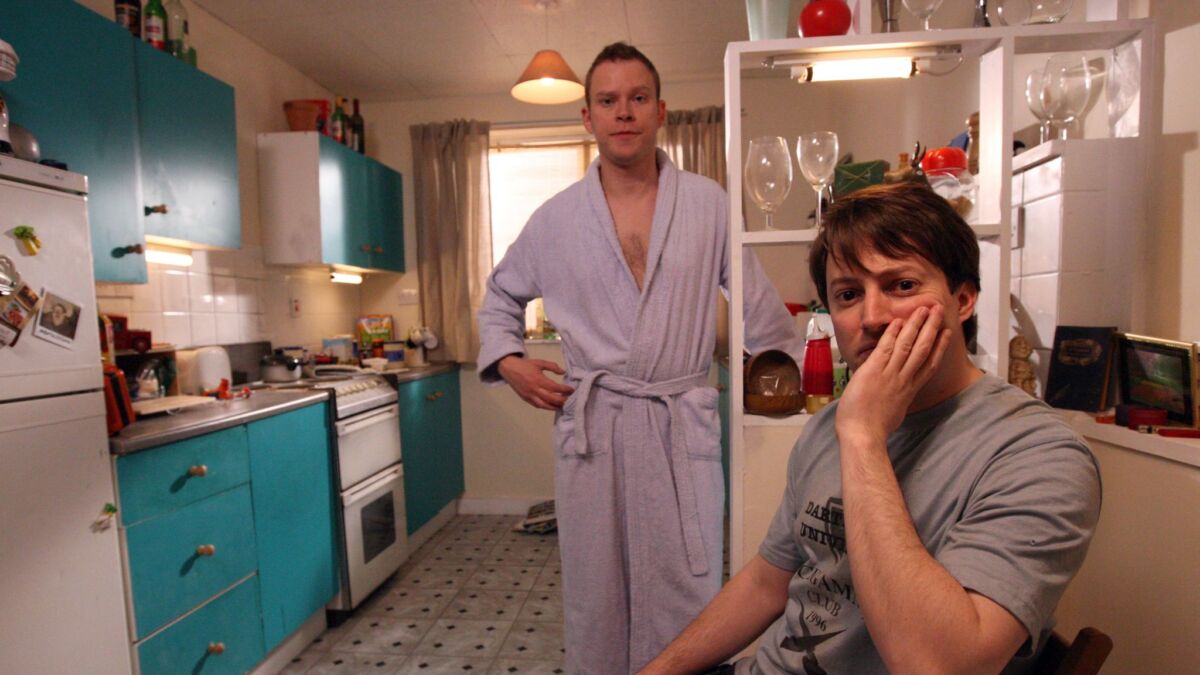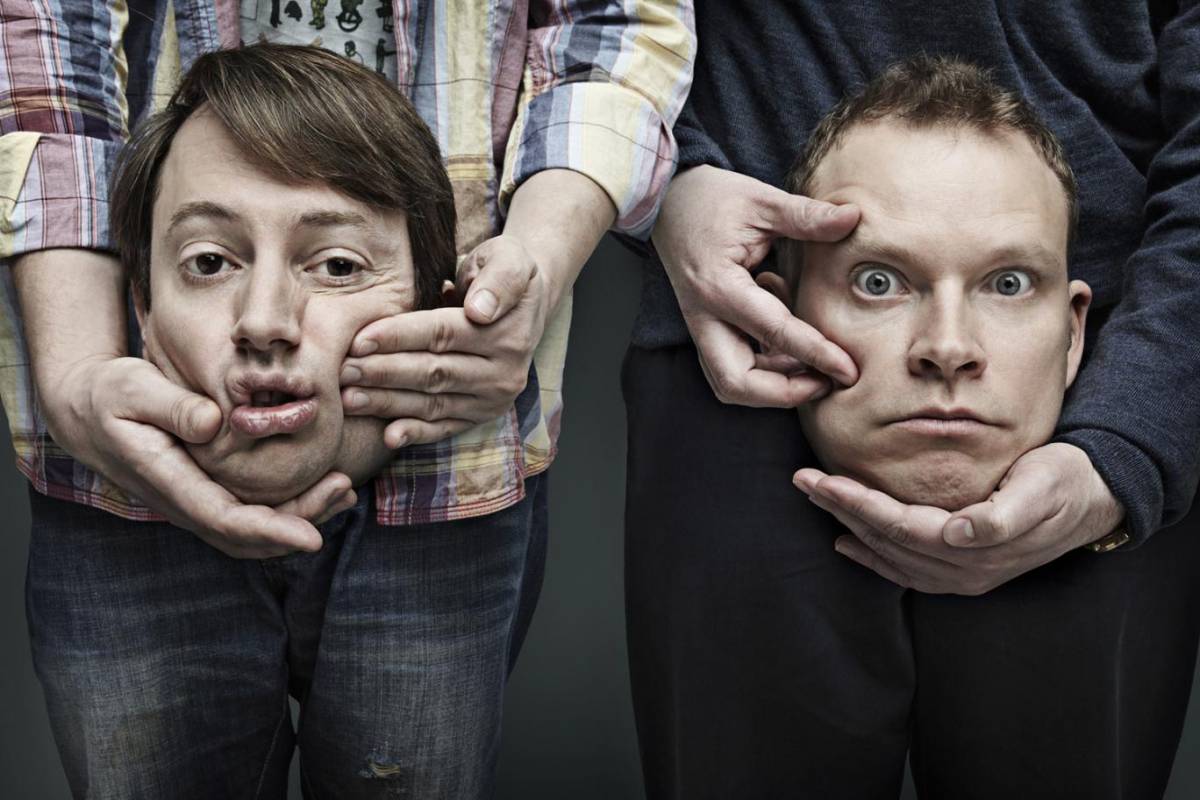When it debuted on Channel 4 back in 2003, the point-of-view urban sitcom Peep Show barely made a ripple across the televisual ocean. Not that it was poorly received, but rather that very few contemporary viewers even noticed that the bright-eyed stars of obscure sketch vehicles Bruiser and The Mitchell And Webb Situation now had their own sitcom about a pair of mismatched twenty-somethings sharing a flat in Croydon.
Why would they? Messrs. Mitchell and Webb were hardly household names at the time of Peep Show’s first airing, and neither were principal writers and collaborators Jesse Armstrong and Sam Bain, the former of whom would later go to create HBO’s hugely popular dynastic drama Succession. The nascent project came into this world not with a fanfare, but with a quiet, unobtrusive cough from somewhere in the corner of the TV schedules.
The premiere season was hardly a tour de force, either. It’s a solid debut for a show that remains an acquired taste at the best of times, but occasionally things are so sinister and surreal that it’s less like watching an accessible sitcom and more like living through someone’s own personal nightmare. Still, if the quality picked up after a rocky opening salvo, the viewing figures did not. Throughout its mammoth run on the British airwaves, Peep Show never achieved the mainstream success it so thoroughly deserved, hardly ever breaking two million viewers in the UK.
What it has achieved, however, is certified cult status among comedy lovers and sitcom aficionados mainly in Britain but occasionally around the globe, a sort of secret handshake of a sitcom that self-styled geeks can use to identify one another at weddings, parties and other social events to which they are occasionally invited. Slinging out a line from the excruciatingly superb Christmas Special or quoting Super Hans’ “people like Coldplay and voted for the Nazis” putdown is a pheromone destined to attract nerds, oddballs and cheerful misfits alike.
Why does Peep Show continue to command such a high cultural status despite never truly breaking into the mainstream consciousness in the same way that, say, Call My Agent! achieved among the French or Mrs. Brown’s Boys managed among the stupid? Part of the answer of course lies within its intrinsic strengths. The writing is consistently superb, the characters are infinitely likable and despicable all in equal measure, and every plot straddles the line between relatable misanthropy and heightened farce. At the risk of sounding reductive, here, Peep Show is just good. It’s really, really good.

I wouldn’t be earning my fee, however, if I left the critical analysis there. Peep Show’s enduring legacy has been secured thanks to its relentless pessimistic tone and the obsessive, even forensic detail it pays to the minutiae of modern social interactions. For the socially-conscious sons and daughters of these anxiety-ridden ages, themes of hopelessness, social rejection and self-hatred resonate like a well-struck comedy gong. At a time when we have become less comfortable with social interaction, seeing such anxieties magnified on the small screen comes as an oddly relatable tonic.
Mark is predominantly the lens through which we experience this intense anxiety about all things social, a walking water torture device whose self-destructive and relentlessly churning inner monologue (always audible for the audience’s pleasure) are forever getting in the way of his own success, happiness and spiritual satisfaction. Mark epitomises the post-Radiohead, post-internet generation of anxious young men desperately striving to find a place in the world that they perceive has little love for them, even if much of this paranoia is brewed in their own relentlessly self-critical minds. No wonder Mark’s “How do I feel? Empty? Check. Scared? Check. Alone? Check” has become one of the show’s most recognised and well-quoted aphorisms.
Modern society has always been characterised by fear and loneliness, but ours is a generation particularly prone to Mark’s very relatable brand of self-hatred intermingled with intense self-pity. We are the generation all too attuned to the ills of the world thanks to 24-hour news access and the democratisation of digital media, either too helpless or too inert to do anything about it. Either way, we all come back to Mark’s way of thinking, that everything is pointless and we all must settle for our respective lots, like feudal villeins scrabbling around for the last cabbage while our uncaring liegelords dine on venison in their lofty, well-lit halls.
It’s either that or become a Jeremy, a self-delusional waster hoping that the success we’re convinced we deserve is just around the corner. At a time of spiritually itinerant young men desperately seeking direction in the form of self-appointed internet messiahs, gurus and pseudo-intellectuals, Jeremy’s indolence born out of a complete lack of direction resonates just as strongly as Mark’s desperate march through the unforgiving corporate meat grinder. When the facade cracks after a semi-ironic visit to a local Wellness cult, it doesn’t take long for Jeremy to tearfully admit to a total stranger the truth of his existential predicament: “I thought I knew what I was doing with my life, but I haven’t got a fucking clue”.
Had he been born ten years later, Jez would likely be hopelessly addicted to scrolling through YouTube videos that promise to make you a paleo-alpha male millionaire by people like Andrew Tate. In their absence, he falls back into a fantasy world of arrested development, drug taking and meaningless relationships, dodging work in the mistaken belief that he is the next great undiscovered musician despite his age, idleness and complete lack of actual talent.
This is the great trick of Peep Show. Each of its characters represents a facet of our own anxiety-ridden psyche that we find cathartic whenever it’s rendered in its most grotesque form onscreen. Other figures in the mundane, often actively cruel world of south London represent either the people we wished we were or those of whom we are scared, envious or quietly scornful. Mark develops a confused quasi-sexual crush on dynamic (if eccentric) boss Alan Johnson because he’s a go-getting repository of kinetic buzzwords and boardroom bullshit who tries to get through his tai chi routine in record time and makes passengers in his car change gear for him. Johnson’s facade is a con, but it’s a con that Mark is so desperate to buy into. One more promotion, raise, or flatscreen TV and he’ll be happy, he thinks.
If Johnson is the everything to which Mark aspires in the world of business, Super Hans is everything to which Jez aspires in the world of slacking off. He may be a drug-addled waster with a penchant for crack and a menagerie of venomous snakes, but Hans’s bravado sees him through where Jeremy’s bungling delusion cannot. Out of the pair, it is Hans who usually lands on his feet, not Jeremy. Hans ends up married (for a while), semi-contented and often finds his most major character flaws are rarely punished for any substantial period, eventually drifting off to Macedonia to set up a moped rental firm. Jeremy ends the entire show as he started it, with only Mark for company. Neither is happy. Both are settling for the other.
All of this relentlessly narcissistic introspection only compounds the pair’s continuing miseries. Most sitcoms concede to the idea that the constant ill-fates of their respective protagonists, be they Terry Scott or Basil Fawlty, are at least somewhat undeserved. “Fortune vomits into my kettle, once again” as Edmund Blackadder famously bemoans. In Peep Show, the overriding message is that if Mark and Jez were able to overcome their internalised fears and social anxieties, most of their disastrous predicaments would simply fade into mist.
Mark ends up committing arson and hiding from his fiance Sophie on his wedding day because he can’t bite the bullet and reveal he doesn’t love her, even having an innocent personal trainer fired because of paranoid delusions he might reveal Mark’s terrible secret. Jeremy’s motivations are, admittedly, far more nakedly selfish – he nearly murders a Polish girl by trapping her in a flotation tank so that he can flirt with an ex, waterboards a man in order to get his room in the flat back and, at a particularly low point, eats a burnt dog rather than admit that he was implicit in its accidental murder. Either way, his transgressions all stem from the same pathetic fear, cowardice or egocentrism.
And at the end of it all, nothing changes. Peep Show’s final scene sees the action return to the living room of the flat, with Mark and Jez sitting looking at one another, one supine on the sofa complaining that he’s tired, the other sitting upright in his favourite chair fretting about the return of wolves and smallpox. There’s no glamour to the finale, no happy resolution or cheerful moment of revelation that, in fact, Mark’s insecurities are at the root of his many fuck-ups or that Jeremy’s lack of direction is causing his unremittingly delusional sloth. We go back to the beginning, twelve years later, with no grand narrative or purpose and practically no character development whatsoever. Because that, terrifyingly, is often what life is. It isn’t a narrative arc. It’s just a thing that keeps happening, and unless we face up to our flaws and face our fears, we’ll never, ever change.
READ MORE: Where To Watch Peep Show
Some of the coverage you find on Cultured Vultures contains affiliate links, which provide us with small commissions based on purchases made from visiting our site.

